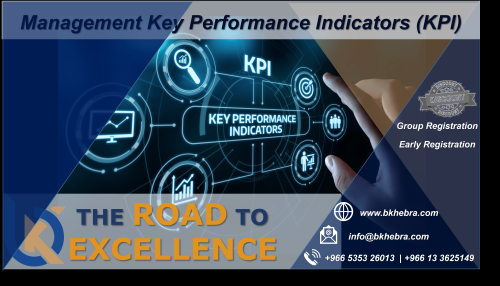| Training Code | Date | Duration | Venue | Fees |
|---|---|---|---|---|
| Keep following, we are updating our training schedules. | ||||

Public and private sector organizations alike are increasingly engaged in adopting the Key Performance Indicators (KPIs) mechanism for monitoring and measuring their employees’ performance levels. Line managers - now more than ever - are conscious of the need for establishing quantifiable performance measures (KPIs) to continuously monitor and measure the progress and accomplishment on defined employee objectives. This ultimately helps the organization foster a performance culture that promotes consistency and objectivity, and hence fairness and credibility throughout the performance management process.
Employee KPIs are instrumental in the strategic planning process to ensure alignment of employee objectives and KPIs with the department’s objectives and KPIs. Thus, employee KPIs can help improve the execution of the overall organizational strategy.
Additionally, the micro-level analysis of output of the employee’s targets provides clear feedback for the management and hence improves the quality of decision making at the department as well as the organizational levels. This intensive training programe will provide both managers and employees with the knowledge, skills and best practice techniques for developing, deploying and managing KPIs and setting targets at the employee’s level.
This 3-days B. Khebra’s training program will allow participants to gain a comprehensive overview and technical background of the KPI mechanism and tools, specifying the types of employees KPIs and their various uses in measuring the progress achieved on individual objectives. They will learn how to recognize good and meaningful KPIs and how to maintain a balanced measurement approach across cost, quality and timeliness or other strategic core categories. They will have the opportunity to practice using tools for monitoring KPI thresholds throughout the performance year: actual vs. planned, including final interpretation of the employee’s end-of-year performance appraisal ratings.
Line managers, regardless of their field of expertise, interested in measuring employee performance by using KPIs will find great value in having a structured approach to the implementation of a KPI mechanism, as well as best practice in the field
HR professionals, such as HR Consultants, HR Managers or HR Associates will have exposure to a rigorous approach of developing, deploying and managing KPIs for individual performance management
Corporate professionals from Strategic Planning, Quality Assurance and Business Process Improvement disciplines (who are involved in such a project) will gain the knowledge required in order to understand the steps to be followed in the implementation process of their projects
Entrepreneurs, analysts and professionals from any field, interested in measuring employee performance, will acquire the knowledge needed to understand how productivity is impacted when appropriate measurement methods are used and how that could help them improve the employee engagement levels within their companies
On successful completion of this training course, BK’s Certificate with eligible Continuing Professional Education credits (CPE), will be awarded to the delegates , one CPE credit is granted per 50 minutes of attendance.